AISEO Strategy for Small Businesses
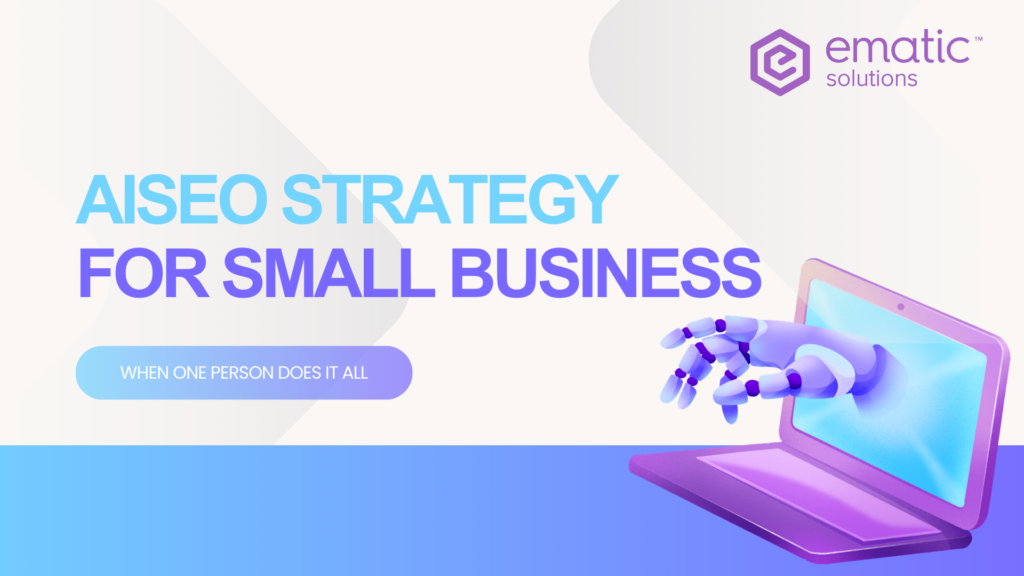
In large companies, SEO is a team sport. There are technical specialists, content strategists, developers, analysts, and project managers. Everyone has a lane and their own roles. In a small agency, there is usually one person: that person is the generalist marketer. What are they doing? And somewhere in that chaos, they’re expected to “handle AI SEO.” The Hidden Pressure on the Generalist Marketer Small agencies survive on versatility. The same person might manage Google Ads, Meta campaigns, email flows, analytics dashboards, website edits, and client calls. Now add AI-driven search into that mix. AI SEO is not just “write better blog posts.” It requires thinking about structure, context, internal linking, data clarity, and how machines interpret information. It leans into engineering thinking: systems, architecture, and consistency. But the generalist marketer is operating in survival mode. They don’t have three uninterrupted hours to rethink site architecture. They have 20-minute windows between Team messages. They don’t have a development team ready to deploy structured changes, they have limited CMS access and a to-do list that keeps growing. This creates a real constraint. Not a lack of skill.Not a lack of intelligence.But a lack of focused bandwidth. AI Changed the Rules and Raised the Bar Traditional SEO used to be slower. You could publish a blog post, build a few links, tweak some keywords, and wait. Today, that’s not how it works anymore. Search engines are now powered by AI. They interpret meaning, context, intent, relationships between topics. Content is no longer judged just by keywords, but by how clearly it answers questions and how well it fits into a bigger content ecosystem. This means SEO now demands: In other words, it demands systems thinking. And systems thinking is hard when you’re constantly switching tasks. Context Switching Is the Real Enemy Small agency marketers rarely work in deep focus. Their day looks like this: Each task pulls the brain in a different direction. AI SEO, however, needs continuity. It needs you to zoom out and see how page A connects to page B, how blog clusters support service pages, how messaging aligns across the site. That kind of thinking doesn’t happen well in fragmented time blocks. So what usually happens? SEO becomes reactive.Small fixes.Quick updates.Random blog posts. No real structure. No repeatable model. The Old SEO Model Doesn’t Fit Small Agencies Anymore In bigger organizations, SEO often involves detailed audits of every page, long reports, technical deep dives, and weeks of recommendations. That approach simply does not scale inside a small agency. You cannot: There isn’t time. There isn’t budget. There isn’t a dedicated team. So if AI SEO is going to work in a small-agency environment, it has to adapt to reality. What AI SEO Must Look Like in a Small Agency For small teams, AI SEO must be: 1. Lightweight It should not require massive documentation or endless analysis. Simple frameworks beat complex playbooks. If it feels heavy, it won’t get implemented. 2. Structured Every page should follow a predictable format. Structure reduces decision fatigue. It also helps search systems understand your site faster. 3. Repeatable If a strategy only works when you personally execute it with full focus, it’s fragile. Instead, you need repeatable systems: Repeatability protects you when you’re tired or rushed. 4. Tool-Assisted Small teams cannot manually analyze everything. AI tools should assist with: The marketer becomes the decision-maker, not the one doing every micro-task manually. (Read more HERE) 5. Architecturally Consistent This is where most small agencies struggle. Without a clear site architecture, content becomes scattered. Pages compete against each other. Topics overlap. Authority gets diluted. Architectural consistency means: It’s not about perfection. It’s about coherence. The Operating Model Must Match Real Life Here’s the uncomfortable truth: AI SEO in small agencies must expect partial attention. It must expect that the marketer: So the system must be built for short working sessions. If progress requires three hours of deep technical thinking, it won’t happen. But if progress can happen in structured blocks: update one section, improve one cluster, refine one page template. It becomes manageable. Really, AI SEO becomes something you iterate on, not something you overhaul. The Real Shift: From Campaign Thinking to System Thinking Many small agencies approach SEO like they approach ads: as a campaign. Launch. Optimize. Report. But AI SEO works better as infrastructure. It’s closer to building plumbing than running a promotion. You don’t “run” AI SEO.You design it once.You refine it slowly.You maintain consistency. That mindset shift alone reduces pressure. Instead of chasing rankings every week, you focus on strengthening structure. Instead of publishing random content, you reinforce your architecture. Final Thoughts: It’s Not About Doing More Small agency marketers are not failing at AI SEO because they’re behind. They’re overloaded. The solution isn’t to work longer hours or learn ten new technical skills. The solution is to design an AI SEO model that respects constraints: When AI SEO becomes lightweight, structured, repeatable, tool-assisted, and architecturally consistent, it stops being a burden. It becomes a system that works quietly in the background — even when you’re busy running ads, fixing CRM workflows, and replying to client emails. And in a small agency, that’s the only kind of system that survives.
E-E-A-T Explained: Building Website Trust
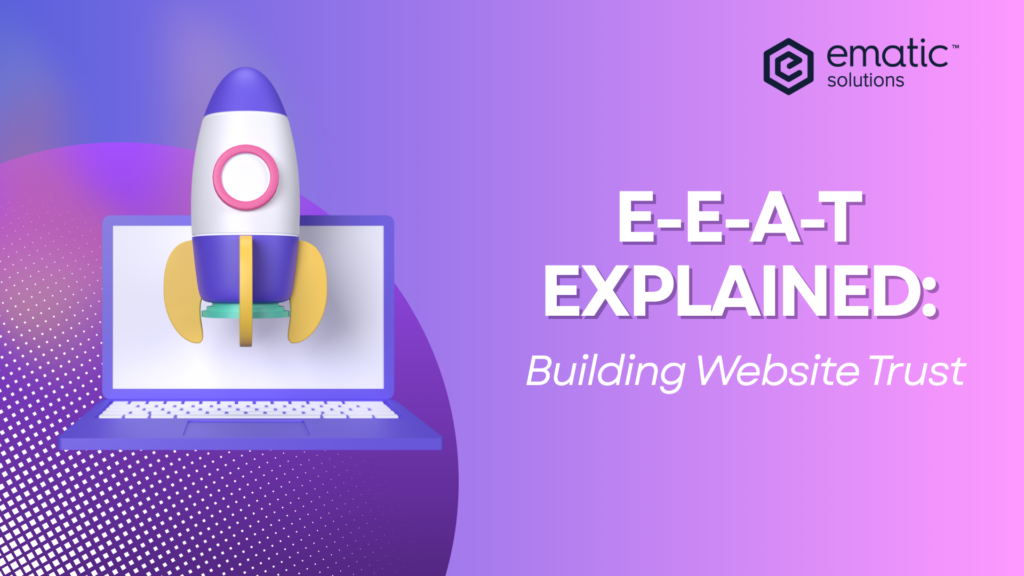
If you follow the world of SEO (Search Engine Optimization), you’ve probably heard the term E-E-A-T a lot lately. It stands for Experience, Expertise, Authoritativeness, and Trustworthiness. It’s Google’s way of judging the quality of a page, and it’s essential for getting your content seen. But here’s the most important thing to understand, straight from Google’s John Mueller: You cannot ‘add’ E-E-A-T to your website like you add a keyword or an internal link. It’s not a plugin, it’s not a special piece of code, and it’s certainly not a magic powder you can sprinkle on your pages. E-E-A-T is something you have to be, not something you can fake. The Misunderstanding: Why You Can’t Just ‘Add’ It When SEOs talk about “optimizing for E-E-A-T,” they often focus on superficial fixes, like: John Mueller was clear: “You can’t sprinkle some experiences on your web pages. It’s like, that doesn’t make any sense.” The Reality: Google doesn’t look at a piece of text that claims you’re an expert. It looks at real-world signals that prove it—like who links to you, what customers say about you, and if you truly offer unique, first-hand knowledge. When It’s a Requirement vs. When It’s a Bonus Google has different standards for different topics. They divide the internet into two main categories: 1. YMYL: Your Money or Your Life For certain topics, E-E-A-T is not just nice to have; it’s a fundamental requirement. 2. The Everyday World (Non-YMYL) For most other websites like a blog sharing travel tips, a recipe site, or a review of a new video game, the pressure is lower. How to Build Real Trust Instead of trying to ‘add’ E-E-A-T, focus on doing the things that create it naturally: Instead of… Focus on… What to Do Now Adding an empty ‘About Us’ page. Being Transparent. Make your contact info easy to find. Clearly state your refund/privacy policies. Writing generic content. Sharing First-Hand Experience. Include original photos, video reviews, and unique insights from your actual work. Claiming to be an expert. Earning Reputation and Mentions. Do great work that gets you mentioned (linked to) by other trusted sites and sources. Ignoring the author. Highlighting the Real People. Give your writers and contributors clear, detailed bios showing their real-world experience. The Bottom Line: For most websites, E-E-A-T isn’t about pleasing the Google algorithm with tags or code. It’s about being a real, reliable source of information for your audience. Build a great, trustworthy resource, and the SEO will eventually follow. Do you have a non-YMYL website (like a recipe blog or travel site) and want ideas on how to showcase your unique experience? Contact us now and get the best of SEO audit!
How Bots Affect SEO and Website Traffic
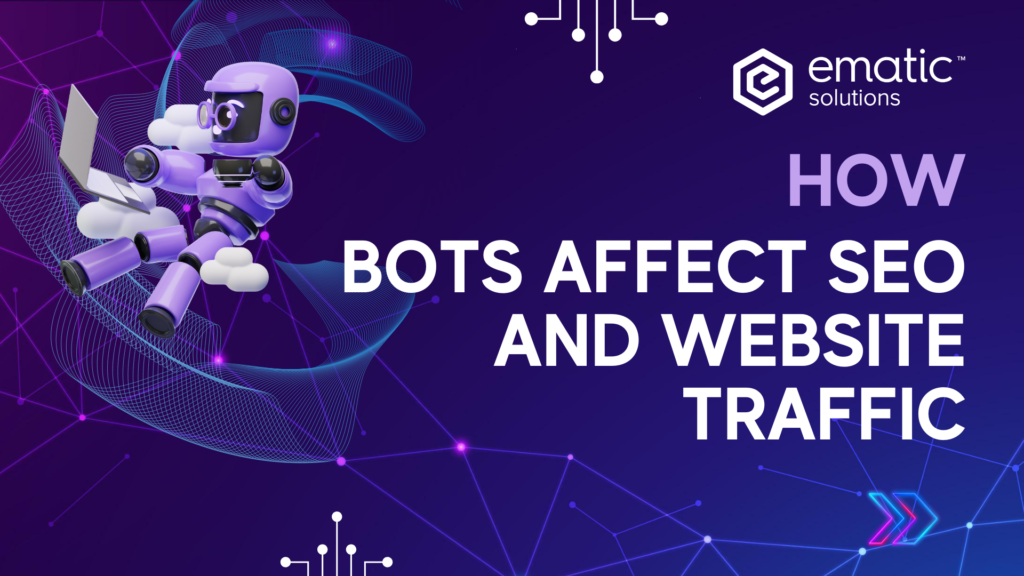
When most people think about SEO, they think of keywords, backlinks, and writing good content. But there’s one thing that doesn’t get talked about enough — bots. Some bots help your site get found on Google. Others do the opposite; they mess with your traffic numbers, slow your site, and even waste your ad money. Knowing the difference can save you a lot of time, money, and frustration. What Are Bots, Really? A bot is just a computer program that does things automatically. It might visit websites, click on links, or collect information, without a human behind it. There are two main kinds of bots: Good bots help your SEO. Bad ones can mess it up big time. How Bad Bots Can Hurt Your SEO Bad bots don’t just create fake numbers, they can actually hurt how your site performs in search results. Here’s how: They Mess Up Your Data They Slow Down Your Website They Waste Your Money They Make You Look Spammy They Hurt Your Rankings The Good Guys: Search Engine Bots Not all bots are bad. Search engines like Google, Bing, and Yahoo all use bots — also called crawlers — to scan websites and figure out what they’re about. These crawlers help your site appear in search results when people look for something you offer. If your website is easy to crawl and loads fast, these bots will index it better, which can improve your visibility. So, while you want to block the bad bots, you still need to let legit search bots do their job. Why Fake Traffic Is a Big Deal Search engines like Google care a lot about trust and real engagement. When fake traffic floods your site, it makes your performance data unreliable. Here’s what that means for you: It’s like thinking your restaurant is full because of noise from outside, but nobody’s actually eating inside. How to Spot and Stop Bad Bot Traffic You don’t need fancy software to spot bots, just a bit of awareness and a few simple tools. Here are some easy ways to protect your site: The Future of Bots in SEO Bots are getting smarter. Some are now powered by AI, which makes them harder to detect. They can copy human behavior: scrolling, clicking, even filling out forms. That means website owners need to keep an eye on their traffic and not rely blindly on numbers. Over time, managing bot traffic will become just as important as managing keywords and content. Final Thoughts Bots aren’t going away. Some are necessary — they help search engines do their job. But others can cause real problems if you ignore them. To keep your SEO healthy: Real people are what matter, not inflated numbers. The cleaner your traffic, the stronger your SEO will be in the long run. Key Takeaway:Not every website visit is a win. Focus on real visitors, not fake traffic. Bots can help or hurt your SEO — the trick is knowing which ones to welcome and which ones to block.
Conversational SEO: The Future of Search in 2026
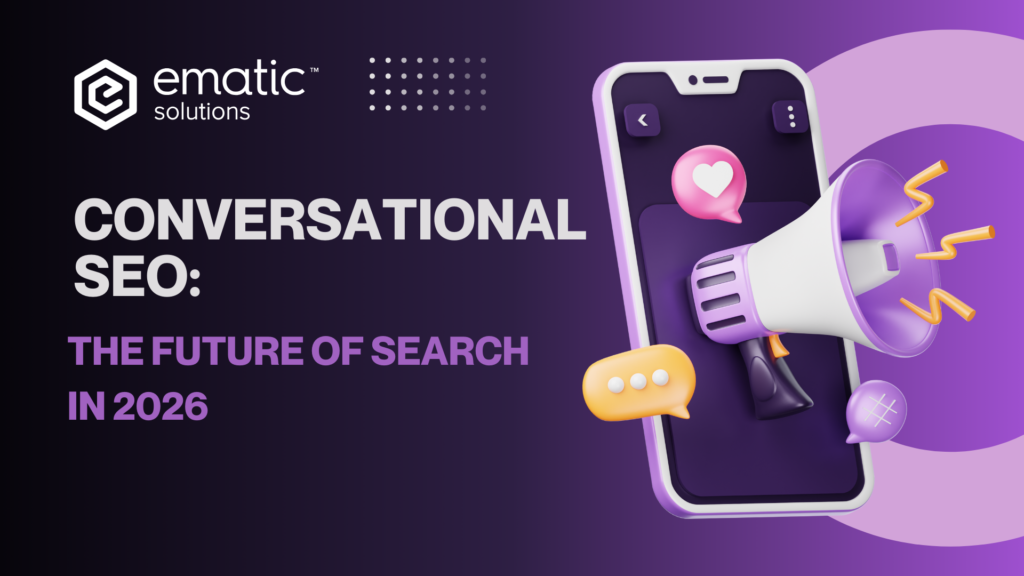
SEO is changing faster than ever, and by 2026, the biggest difference-maker won’t be complex technical tricks or keyword counts, it will be about real conversations. Think about it: voice search is everywhere, AI chatbots are becoming our go-to assistants, and new search engines are generating full answers instead of just lists of links. All of this is pushing brands to do one thing: optimize their content for natural, human-like chat. We call this: Conversational SEO. Why Your Old Way of Searching Is Irrelevant People simply don’t search the way they did a few years ago. No one types the short, clunky phrases anymore. Instead of typing “best running shoes 2026,” we ask full, detailed questions: Today’s AI-powered search engines are brilliant at understanding the intent behind those questions. They don’t just point you to a website; they generate a clear, direct answer right on the screen. The takeaway? Your business needs to make content that directly matches how people naturally speak and ask for help. Voice and AI are the New Search Bar By 2026, talking to your technology will be completely mainstream. Whether it’s your smart speaker, your car assistant, or your wearable tech, users are speaking their searches instead of typing. At the same time, AI assistants (like the ones from Google, OpenAI, or Perplexity) are flipping the script on how we find information. We don’t want to scroll through a never-ending list of blue links; we want an instant, direct answer. For your content, this means the stuff that wins isn’t the stuff jammed full of keywords; it’s the content that answers the user’s question directly, clearly, and in a friendly, conversational tone. Your 5-Step Game Plan for Conversational SEO Ready to make the shift? Here’s how you prepare your content to win in the new era of search: Final Thought Conversational SEO isn’t some fleeting trend; it’s about survival. As AI takes over discovery, the old rules of SEO won’t work anymore. Brands that learn to craft content that sounds like a helpful chat instead of a dry textbook will earn more visibility, build more engagement, and ultimately gain more trust. The future of search belongs to the businesses that master the art of being genuinely helpful. If your content can answer like a trusted friend, you’ll be the one winning those conversations. Are you ready to stop writing for search engines and start writing for people? Contact us now for more details!
AEO vs GEO in Digital Marketing: What They Mean and How to Use Them
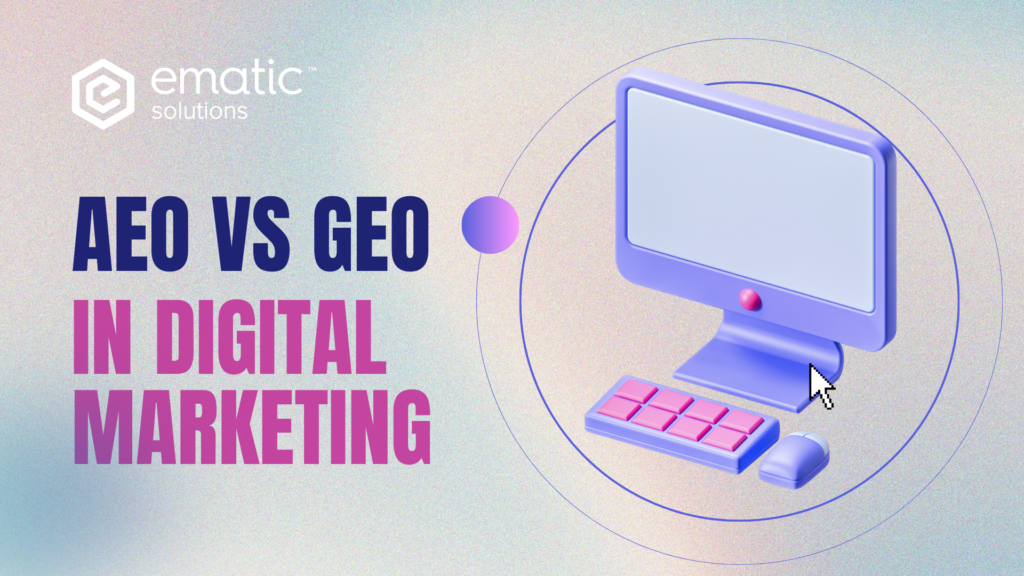
Search is changing fast. Google results aren’t just “10 blue links” anymore, and people aren’t only going to search engines for answers, instead they’re asking AI assistants like ChatGPT, Claude, and Gemini. This shift has created two new marketing priorities: Image 1 shows NTUC FairPrice appearing in AEO when searched for “best grocery shop in Singapore” AEO: AI Engine Optimization AEO is about making your brand part of conversations with AI tools. When someone asks ChatGPT, “What’s the best project management software for small teams?”, the AI doesn’t list every website, it summarizes and recommends a few. If you want your product to be named in that answer, you need AEO. Actionable AEO Tips 👉 Notes: Write in clear, conversational language and make your brand easy for AI tools to understand. GEO: Generative Engine Optimization GEO is about being cited in generative search engines. If someone searches on Google SGE or Bing AI for “best CRM software for small businesses”, the AI-powered summary appears at the top. Instead of just a list of links, you see a paragraph answer—and only a few sources get cited. You want to be one of them. Actionable GEO Tips 👉 Notes: Think less about ranking on page 1, more about becoming the “go-to source” generative engines cite. AEO vs GEO: Quick Comparison Factor AEO (AI Engine Optimization) GEO (Generative Engine Optimization) Where it applies AI assistants (ChatGPT, Claude, Gemini, Copilot) Generative search engines (Google SGE, Perplexity, Bing AI) How people interact Conversations, Q&A, problem-solving Search queries, research, shopping Optimization focus Conversational, structured content, entity recognition Fact-rich, clear, and easy-to-cite content Website example ClickUp blog (FAQ-style, conversational) NerdWallet (tables, data-rich comparisons) How Businesses Can Start Now SEO is still essential, but AEO and GEO are the new future. To ensure your business appears in AI-powered answers be it from chatbot responses to generative search summaries, combine traditional SEO methods with both AEO and GEO. This approach will keep your business relevant and visible in the ever evolving digital market. 👉 AEO gets your brand into AI conversations.👉 GEO gets your content cited in AI-powered search. The smart move? Start building both into your digital strategy now! Contact us to get started.

